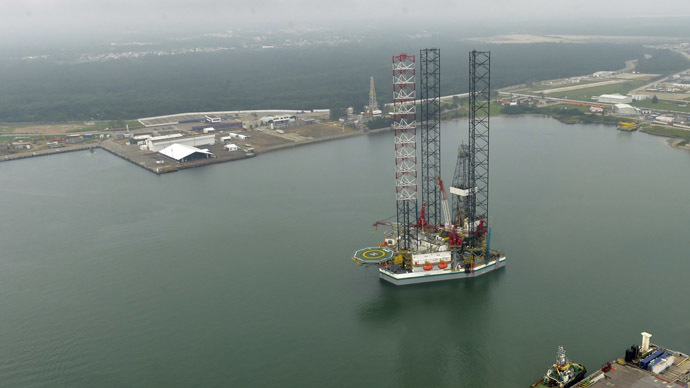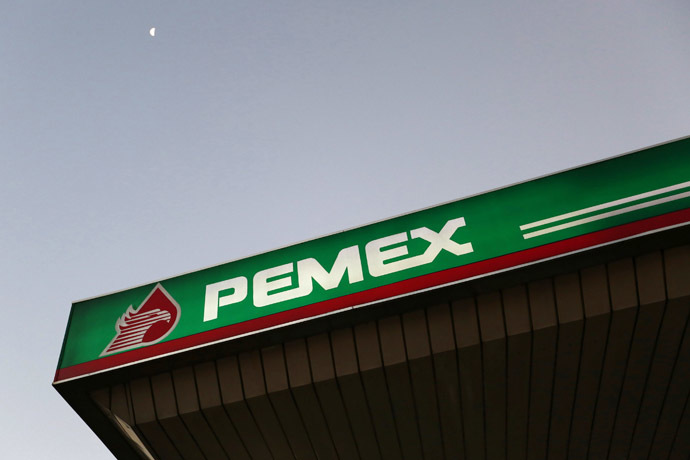‘Energy companies put safety second, profit first’

Governments across the world should establish much more aggressive and precocious regulations to reduce the number of accidents on oil rigs in the future, social and environmental justice campaigner George Barda told RT.
According to George Barda, the scale of the accident on a Pemex oil processing platform in the Gulf of Mexico “is much smaller that Deepwater Horizon, the BP disaster in 2010.”
Dr. Mamdouh Salameh, international oil economist and consultant on the recent accident in the Gulf of Mexico: “That platform according to information from the US Department of Energy produces 300,000 barrels a day, so it cannot be compared with the British Petroleum platform in 2010 which leaked a few million barrels of oil into the sea. Until we know how much has leaked [as a result of Wednesday’s accident] it will be difficult to ascertain the environmental damage.”
RT:The oil rig's operator, Pemex, has a history of similar incidents. In 2012, a fire at its gas facility killed 26. What do you know of this firm's safety record?
GB: What I know is that in 2013, 37 people were killed at their Mexican headquarters, as well. This is the third significant accident that they’ve had in a few years. And it is not the first in the Gulf of Mexico this year. We are really talking about an industry that is inherently dangerous whether it is BP, Exxon or Pemex, or the others, this is a very dangerous industry especially when you’re drilling in deep water.

RT:In your opinion what was the cause of incident?
GB: It is too difficult to say. Obviously, there has been some kind of leak that has caught fire. But it is too early to say at this stage what was the precise cause of the explosion. Inherently combustible materials are being dealt with - whether it is oil, or gas, or both. Obviously there was some kind of lapse in safety. It remains to be seen whether they will be employing a release pipe and that will be decided by how badly the problem develops in the next 24 hours or so.
RT:The BP oil spill in April 2010 had a disastrous environmental impact. Are there already likely to be consequences from the Pemex rig?
READ MORE: Fire blazes on oil platform in Gulf of Mexico, 4 dead, multiple injuries reported
GB: I think no… If you look at the response of BP since 2010 and you see this from all the energy companies when something goes wrong, their approach throughout is to try to minimize the responsibility that they take for that accident. This is a history that goes back hundreds of years in fact, of companies that put safety second and profit first. I wouldn’t be surprised if we find out when the details will come out from this that that’s what happened here… I mean the BP case- there was an enormous fine paid based on charges of criminal negligence, and whether there has been actual criminality in this case, it remains to be seen. Like I said it is always profit first, and safety second. And it’s ordinary workers for this company that pay the price sometimes with their lives. We often talk about the people who died from all these reasons, but serious injuries that people suffer often - that is something that is going to affect them and their families for decades to come.
Dr. Mamdouh Salameh, international oil economist and consultant on the recent accident in the Gulf of Mexico: “Pemex platforms have had two or three accidents in the last 5 years… the record is not that good and the regulations have to be tightened. But accidents will always happen, and you cannot stop them happening.”
RT:What do you think should be done to prevent these kinds of situations in future?
GB: I think you need much stronger regulation. The problem we have is not just in the fuel industry but across the board is an approach by governments across the world to essentially allow business to regulate itself. And clearly the frequency of accidents we see in the Gulf of Mexico and elsewhere suggests that we really need to return to a sensible idea of regulation where governments see their job as making sure that things don’t go wrong rather than after the fact coming in and pointing out the failures. I think we need much more aggressive and precocious regulation effectively to try to make sure that these kinds of accidents don’t happen in the first place.
The statements, views and opinions expressed in this column are solely those of the author and do not necessarily represent those of RT.
The statements, views and opinions expressed in this column are solely those of the author and do not necessarily represent those of RT.












